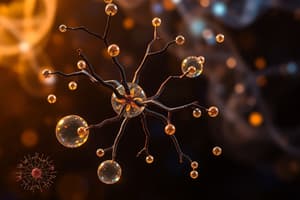Podcast
Questions and Answers
What is the key characteristic of scientific knowledge regarding its stability?
What is the key characteristic of scientific knowledge regarding its stability?
- It is open to revision based on new evidence. (correct)
- It is based solely on personal beliefs.
- It requires no evidence to support its claims.
- It is always final and unchanging.
What distinguishes observation from inference in the scientific process?
What distinguishes observation from inference in the scientific process?
- Observation is subjective, while inference is objective.
- Observation relies solely on data collection, while inference involves explanations. (correct)
- Observation is always inaccurate, while inference is accurate.
- Observation uses prior knowledge while inference does not.
What does empirical evidence in science primarily rely on?
What does empirical evidence in science primarily rely on?
- Data gathered through observation or experimentation. (correct)
- Theoretical assumptions.
- Historical documentation and anecdotes.
- Intuition and personal experiences.
What is the role of scientific laws in the field of science?
What is the role of scientific laws in the field of science?
Why is the process of science considered vital?
Why is the process of science considered vital?
What does the term 'tentativeness' refer to in scientific knowledge?
What does the term 'tentativeness' refer to in scientific knowledge?
What is one of the basic science process skills?
What is one of the basic science process skills?
Which of the following statements about research methods in science is accurate?
Which of the following statements about research methods in science is accurate?
Which skill involves ordering objects without regard for quantitative units?
Which skill involves ordering objects without regard for quantitative units?
Which method is primarily used for measuring quantities indirectly?
Which method is primarily used for measuring quantities indirectly?
In life sciences, what aspect of organisms do children increasingly learn about as they age?
In life sciences, what aspect of organisms do children increasingly learn about as they age?
What is one of the main goals of science education according to the content?
What is one of the main goals of science education according to the content?
Which skill is associated with evaluating scientific theories and evidence?
Which skill is associated with evaluating scientific theories and evidence?
What is necessary to support creative solutions in science education?
What is necessary to support creative solutions in science education?
Which approach allows for the comparison of time to units developed from periodic motions?
Which approach allows for the comparison of time to units developed from periodic motions?
What does correctly identifying internal and external structures in organisms help explain?
What does correctly identifying internal and external structures in organisms help explain?
What is the ultimate goal of science education?
What is the ultimate goal of science education?
Which method is NOT indicated for measuring objects or events?
Which method is NOT indicated for measuring objects or events?
What type of skills should the science curriculum in elementary grades aim to develop?
What type of skills should the science curriculum in elementary grades aim to develop?
How can students understand the costs of items through practical activities?
How can students understand the costs of items through practical activities?
What is an example of using nonstandard measures in classroom activities?
What is an example of using nonstandard measures in classroom activities?
Which question best demonstrates the scientific exploration of time management?
Which question best demonstrates the scientific exploration of time management?
What contributes to scientific curiosity and reasoning according to the educational goals?
What contributes to scientific curiosity and reasoning according to the educational goals?
What is a valid way to measure the distance traveled to a location?
What is a valid way to measure the distance traveled to a location?
What is a key component of scientific communication according to constructivist views?
What is a key component of scientific communication according to constructivist views?
Which of the following best describes generative learning in a constructivist classroom?
Which of the following best describes generative learning in a constructivist classroom?
What skill is essential for students to effectively communicate experimental procedures?
What skill is essential for students to effectively communicate experimental procedures?
How can teachers best help students build on their existing knowledge?
How can teachers best help students build on their existing knowledge?
What type of representations are often used to convey data clearly in constructivist learning?
What type of representations are often used to convey data clearly in constructivist learning?
In grouping or ordering objects, what is the primary basis for categorization?
In grouping or ordering objects, what is the primary basis for categorization?
What is emphasized in science lessons to promote children's conceptual knowledge?
What is emphasized in science lessons to promote children's conceptual knowledge?
Which statement reflects a misconception about good science teaching?
Which statement reflects a misconception about good science teaching?
What is the purpose of using advanced organizers in instruction?
What is the purpose of using advanced organizers in instruction?
How do analogies contribute to the learning process?
How do analogies contribute to the learning process?
Which question best illustrates the concept of predicting?
Which question best illustrates the concept of predicting?
What type of connection does elaboration promote in learning?
What type of connection does elaboration promote in learning?
What type of question enhances students' ability to make predictions?
What type of question enhances students' ability to make predictions?
What is NOT a common way to engage students in making predictions?
What is NOT a common way to engage students in making predictions?
Which scenario best exemplifies the application of advanced organizers?
Which scenario best exemplifies the application of advanced organizers?
Which of the following questions aligns with the inquiry method in teaching?
Which of the following questions aligns with the inquiry method in teaching?
Flashcards are hidden until you start studying
Study Notes
Defining Science
- Science is a systematic process of investigating the natural world. It involves observation, experimentation, and the generation of knowledge.
- Science differs from other disciplines in its focus on empirical evidence, testable ideas, and the pursuit of objective explanations.
The Scientific Method
- The Scientific Method is a structured approach to investigation.
- It involves forming a hypothesis (a testable explanation), designing and conducting experiments, analyzing data, and drawing conclusions.
- The goal of the Scientific Method is to differentiate between correlation and causation.
Key Nature of Science Tenets
- Tentativeness: Scientific knowledge is always open to revision based on new evidence and perspectives.
- Observation and Inference: Scientists gather information through their senses (observation) and use prior knowledge to interpret observations (inference).
- Empirical Evidence: Scientific knowledge is founded on data collected through observation and experimentation.
- Scientific Laws and Theories:
- Laws describe patterns and relationships in nature.
- Theories provide explanations for phenomena, based on a large body of evidence.
The Science Process Skills
- Observing: Gathering information using the five senses, such as describing the color of an object or measuring the length of time it takes to complete a task.
- Measuring: Using standard and non-standard units to quantify properties like length, weight, and time.
- Classifying: Grouping objects or events based on shared characteristics, like sorting rocks based on size and hardness.
- Communicating: Describing observations and conclusions effectively using language and visual representations like graphs and tables.
- Predicting: Making informed guesses about future outcomes based on current knowledge and observations.
Goals of Science Education
- To develop individuals who can think critically about scientific information and make informed decisions.
- To foster future scientists, engineers, and other science-related professionals.
- To cultivate a deep understanding of natural systems and the ability to interpret and explain scientific phenomena.
Constructivist Views in Science Education
- Constructivist teaching emphasizes hands-on, inquiry-based learning, building on prior knowledge and encouraging active student engagement.
- Effective science education involves connecting new information to existing knowledge through strategies like advanced organizers, analogies, and elaboration.
Studying That Suits You
Use AI to generate personalized quizzes and flashcards to suit your learning preferences.




